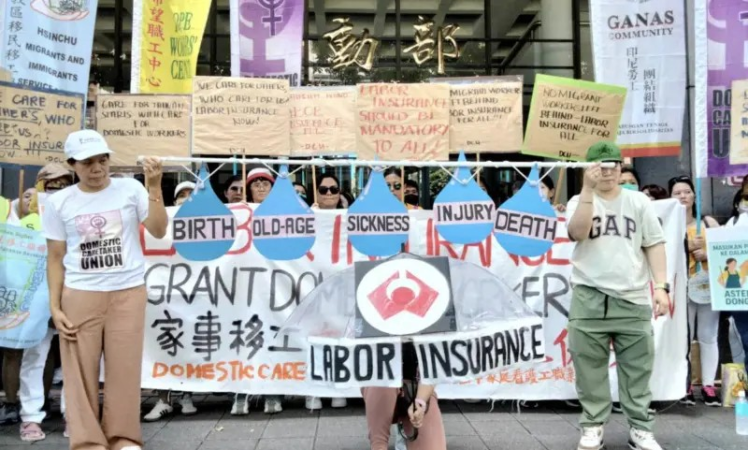
June 16 marks International Domestic Workers Day. In Taiwan, 200,000 domestic migrant workers remain “labor insurance orphans,” facing childbirth, illness, disability, or even death with no protection. On June 15, the Taoyuan Domestic Caretakers Union (DCU) staged a protest in front of the Ministry of Labor, calling on the government to mandate labor insurance coverage for all domestic migrant workers. Several migrant worker unions and human rights organizations joined in solidarity, urging the Ministry to address the institutional exclusion of domestic migrant workers from Taiwan’s labor insurance system.
International Domestic Workers Day commemorates the adoption of ILO Convention No. 189, which established that domestic workers are entitled to labor standards and protections no less than those afforded to other workers. Wang Cheng-yun, secretary of the DCU, pointed out that unlike other industrial workers, domestic migrant workers are still excluded from mandatory labor insurance due to the employment threshold of fewer than five workers. “Although employers may choose to enroll them voluntarily, in reality, domestic migrant workers are institutionally excluded,” said Wang.
Carol, a representative from the DCU, explained that being left out of labor insurance leaves domestic workers completely vulnerable in the face of misfortune. Without labor insurance, they are left with no support during accidents, illness, or disability—and when they grow old and can no longer work, they have no pension to rely on. She emphasized that migrant domestic workers are not asking for special treatment: “We just hope to be treated with the same dignity, fairness, and legal protection as other workers in Taiwan.”
Marni, a representative from Serikat Buruh Industri Perawatan Taiwan (SBIPT), cited the case of a migrant worker in Taiwan diagnosed with cancer. Beyond the burden of expensive medical treatment, the greatest hardship was the complete loss of income during illness and recovery. Since domestic caregivers have no paid sick leave and are excluded from labor insurance injury or illness compensation, Marni stated painfully:
“When we can't work, we have no income to live on.”
SBIPT therefore supports the inclusion of domestic migrant workers in the labor insurance system for fair and equal treatment. Nieh Yung-li of the Migrants Empowerment Network in Taiwan (MENT) pointed out that domestic migrant workers are still not covered by the Labor Standards Act. Though Taiwan’s Control Yuan issued a report as early as 2014 urging improvements to their poor working conditions, the Domestic Workers Act long advocated by MENT has been dismissed by the government using phrases like “legal challenges,” “lack of consensus,” and “need for careful assessment.”
Nieh criticized the Ministry of Labor for treating migrant workers merely as a source of labor without recognizing their humanity. “In addition to demanding mandatory labor insurance coverage for all migrant workers, we also call for immediate legislation to protect domestic workers.”
Lee Cheng-hsin of the Serve the People Association cited the case of migrant fishers to argue that including workers in small-scale employment under five persons in labor insurance is not without precedent. However, domestic workers have yet to be included—an unfair double standard. “The Ministry of Labor should draw from the experience of insuring foreign fishers and implement supporting measures to ensure smooth policy execution.” He also noted that fishers recruited from abroad are similarly excluded, revealing another layer of inconsistency.
Hsiao Yi-tsai of the Serve the People Association’s Migrant Shelter Center explained that in the case of pregnancy and childbirth, domestic migrant workers receive no maternity benefits because they are not covered by labor insurance—a clear form of institutional discrimination. “Although occupational accident insurance was extended to domestic workers in 2022, if they die due to illness or non-work-related accidents, there is still no death benefit.” Hsiao emphasized that regardless of occupation, all families face the same costs in arranging funerals, and workers should not be treated differently based on their job type.
Shih Yi-hsiang of the Taiwan Association for Human Rights criticized the Ministry of Labor for long-term violations of international human rights implementation laws, especially regarding social security rights of domestic and offshore migrant workers. Because of this discrimination, international human rights committees have long urged Taiwan to incorporate ILO Convention No. 189 into domestic law. However, expert teams commissioned by the Ministry concluded—contrary to reality—that all of Taiwan’s laws concerning domestic workers already comply with the convention. Shih called on the Ministry to engage in dialogue with the unions and support groups holding the press conference to accelerate the passage of legislation for Convention No. 189 and to include domestic workers in labor insurance as soon as possible.
At the end of the press conference, union members used raindrops as symbols for birth, aging, illness, death, and injury, expressing that domestic workers—like all other workers—cannot avoid these life events. They called for the same labor insurance umbrella that protects other sectors, offering at least basic economic security during difficult times.
The joint coalition presented two key demands:
- Implement the spirit of ILO Convention No. 189 by mandating labor insurance coverage for all domestic migrant workers.
- Increase the government’s share of insurance premiums to ease the financial burden on long-term care families.
[NOWNEWS / Reporter Lai Cheng-lin / International Desk] 2025-06-16 16:00:58
[Photo by Taoyuan Domestic Caretakers Union ]
